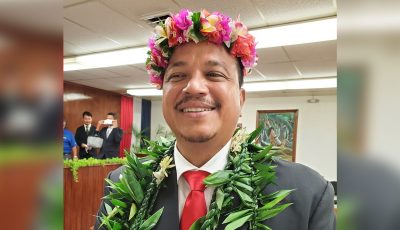House panel opposes status for long-term alien workers
US Senate, House bills to legalize 11 million undocumented aliens gain traction

March for America brings 200,000 people to Washington, DC, to call for comprehensive immigration reform. (From Wikimedia Commons)
During an almost six-hour meeting on Friday morning to afternoon, all seven members of the CNMI House Committee on Foreign and Federal Relations agreed to support Rep. Felicidad Ogumoro’s (R-Saipan) resolution asking U.S. Congress not to act on national immigration reform bills’ provision giving legal, long-term foreign workers in the CNMI a chance to apply for improved immigration status such as “green card” even as the same bills seek to provide pathway to citizenship for some 11 million undocumented aliens in the United States.
The committee, chaired by Rep. Trenton Conner (Ind-Tinian), is recommending the full House membership to adopt Ogumoro’s House Resolution 18-34.
The next House session would be held on Rota on Friday morning.
Conner, in an interview with Saipan Tribune after the lengthy committee meeting on Friday, said there was extensive deliberation on the fact that the U.S. is “unilaterally imposing something on the CNMI.”
He said the committee would like Covenant 902 negotiations to happen, for example, between the CNMI and the United States before any legislation providing pathway to citizenship for aliens in the CNMI.
“The committee has thoroughly reviewed the resolution, and there’s a general consensus among the members that they are in support of the resolution. All their concerns were addressed… in the hopes that House members as a body will also accept the resolution for adoption,” Conner told Saipan Tribune.
He said it’s not that the committee members do not want alien workers to remain in the CNMI, but the members want the CNMI to be consulted first before any national legislation affecting the CNMI could be acted on.
When asked what the committee members would want to consult with the U.S. for example, Conner said there is already a process in place to allow aliens to apply for permanent residency such as waiting for their U.S. citizen children to turn 21 so they can be petitioned.
Moreover, Conner said it is confusing that U.S. Public Law 110-229 provides a phase out of the alien worker population by Dec. 31, 2014, “and then they turned around and put in S. 744 a provision granting status to them. So what do they want?”
But the CNMI-specific provision does not have an automatic grant of status as some CNMI lawmakers claim. Instead, S. 744 and H.R. 15 only allow affected aliens to “apply” for improved status.
Besides Conner, the other committee members that voted to support Ogumoro’s HR 18-34 are Reps. Lorenzo Deleon Guerrero (Ind-Saipan), Ralph Yumul (Ind-Saipan), Antonio Agulto (Ind-Saipan), John Paul Sablan (Cov-Saipan), Christopher Leon Guerrero (Cov-Saipan) and Ogumoro.
The resolution requests the U.S. House of Representatives to “hold indefinitely” any action on Section 2109 of S. 744 and similar legislation “which will allow thousands of alien workers, their families and persons of other ethnic origin or race who are in the [CNMI] to become U.S. permanent residents and subsequently become U.S. citizens.”
Ogumoro’s resolution, co-authored by 11 other House members, asserts that Section 2109 of S. 744 “violates” the Covenant that established the Northern Marianas’ political union with the United States.
CNMI immigration is now under federal control.
Ogumoro introduced the resolution long before the U.S. House also introduced a similar national reform bill, H.R. 15, that also has the same provision as that of in S. 744 pertaining to providing pathway to citizenship to certain long-term, legal aliens in the CNMI.
Delegate Gregorio Kilili C. Sablan (Ind-MP), author of the CNMI-specific provision in S. 744 and H.R. 15, has said he remains committed to keeping families together and protecting the CNMI economy in the wake of Ogumoro’s resolution.
Bonifacio Sagana, president of Dekada Movement, has said many in the community support not only continued access to skilled and professional foreign workers but also improved status for long-term foreign workers, and believes that certain politicians are using the issue to win votes in the 2014 elections.
The CNMI delegate to Congress ealier said he has worked to be sure that people who were protected under CNMI immigration law remain protected under federal law.
“So someone who was born in the Northern Marianas before 1978, or who became a permanent resident under CNMI law, or is part of a U.S.-citizen family will be able to remain in the Northern Marianas—just as we permitted under our own local law. These residents will be able to work and travel and after five years apply for a green card under the bill passed by the U.S. Senate and under the new House bill. Without that, their fate would be uncertain,” Sablan said.
S. 744 and H.R. 15 also allow workers, who have lived in the CNMI since before 2003, “to stay. They can work. They can travel off-island. Then—after an additional five years contributing to the Northern Marianas—they can apply to be a U.S. permanent resident, if they want to. That’s fair and it’s good for our economy,” Sablan had said.
Moreover, Sablan told reporters that if U.S. House Speaker John Boehner puts S. 744 on the floor for voting now, “it has enough votes to pass.”
The CNMI House Committee on Foreign and Federal Relations also recommends full House passage of Ogumoro’s House Bill 18-112, creating a Second Political Status Commission.
The proposed commission would examine whether the people desire continuing in a “political union with the United States of America” pursuant to the Covenant.





















